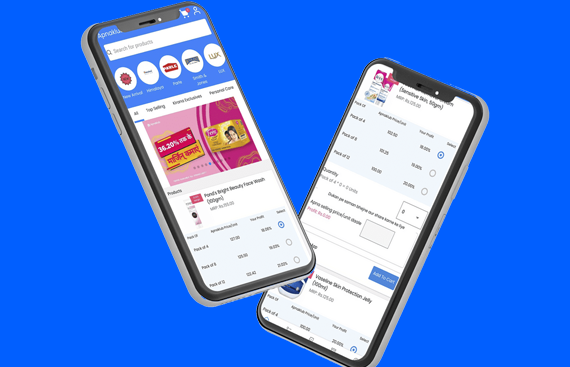Why We Invested In Apnaklub: Digitally Connecting India’s Retailers to Goods and Wholesalers

By Anuradha Ramachandran and Harsh Gupta
Embedded Finance Platform Apnaklub Digitally Connects India’s Retailers, and Kiranas to Consumer Goods and Wholesale Partners
India’s unwieldy consumer goods supply chain poses significant challenges for local grocery retailers and their consumers. The nation’s 12 million kirana stores – small, independent retailers that are often family-owned – provide a critical service in less-populous regions, accounting for more than 90% of sales in the country’s $600 billion groceries market. But kiranas are the last mile of a long, inefficient supply chain that adds costs for consumers and narrows product choice.
Apnaklub, a startup that is connecting India’s wholesalers of daily convenience needs with the digital economy, is working to streamline this process for wholesalers – the small businesses that play a critical role in supplying kirana stores beyond India’s top-tier cities. The platform acts as an aggregator, offering these firms more visibility over consumer demand and access to a wider range of goods and financial services. Apnaklub was founded in July 2019 in Bangalore by Shruti, who previously worked at Omidyar Network and Bain & Company, and Manish Kumar, who served more than 20 years of industry experience including leadership roles at Walmart India, Metro Cash & Carry and Future Group.
Apnaklub is a good fit with our belief in fair finance - it has clear potential to improve financial inclusion, remove costs from an inefficient supply chain and provides another potential use case for embedded finance. We’re thrilled to participate in its $3.4M seed funding round alongside Sequoia Capital’s Surge, Blume Ventures and Whiteboard Capital.
What’s the background?
The distribution process for consumer goods in India starts with brand producers such as Nestle or Hindustan Unilever, which are remote from consumers and have limited insights into demand dynamics across the country. They consign their products to so-called super-stockists, who buy goods and relay them to regional centers before local distributors take over.
In India’s biggest cities, such as Delhi and Mumbai, these distributors supply grocery stores directly, but in smaller cities and rural areas – home to more than 8 million, or two-thirds, of India’s kirana stores – a wholesaler acts as a further intermediary.
This entire system is highly cash-based and inefficient. Because middlemen control access to products and are limited by their own capital, every link in the chain increases costs and narrows product choice for the retailer. As a result, kirana stores often find their shelves filled with slow-moving goods, while fast-moving goods are prone to shortages.
Where’s the opportunity?
Apnaklub onboards wholesalers as partners and digitizes their relationship with retailers. The company’s technology enables retailers’ orders to be aggregated, leveraging economies of scale and providing real-time demand data for producers. Financial services can also be embedded in the app, removing the need for cash advances among smaller players in the supply chain and increasing transaction volumes between wholesalers and retailers.
The platform will enable wholesalers to broaden their supplier relationships so they can offer greater variety to the stores they serve. The stores, by maximizing shelf space and offering more fast-moving products, gain from higher revenues, while brands increase their penetration into rural areas. Apnaklub has enrolled 1,400 partners in the past nine months and enabled transactions in goods worth around Rs 15 million (US$202,000) in June alone.
We believe strongly in the potential of digitalization and embedded finance to streamline this inefficient supply chain and provide an organized supply infrastructure and digital tools to cater to the hyper-local needs of shopkeepers and large families around them. Similar to our investments in MaxAB in Egypt and TaniHub in Indonesia, Apnaklub fits into our principles of fair finance by removing costs and boosting access to finance for small businesses that are a key component in today’s economy.